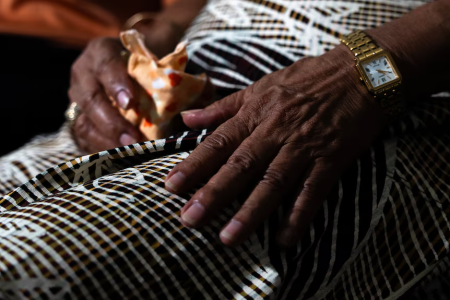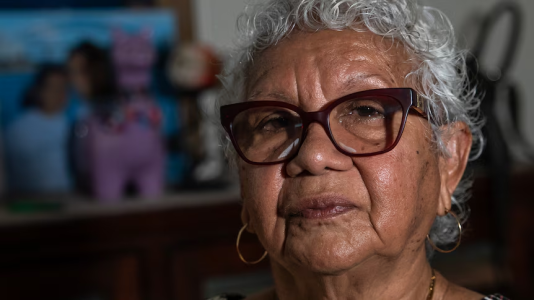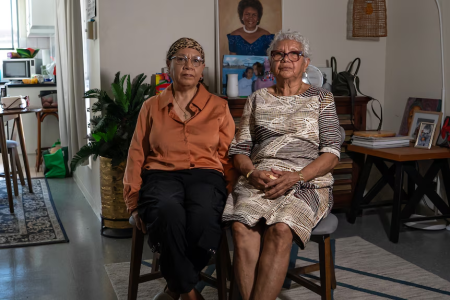Advocates call for elder abuse laws as one in seven senior Territorians face family abuse
By
ABC News
- Replies 0
Over the years, Lynette Stewart has locked herself in rooms, hid in bushes, moved house and endured terrifying treatment at the hands of a family member dealing with substance abuse.
This relative would scale Ms Stewart's high, locked fence to break in, drive his car through her padlocked front gate and sleep outside her front door.
In a recent incident, he drew out a knife and threatened her in the dead of night.
Ms Stewart said she was lucky to escape to the road outside and call the police.
In all of these instances, the man — who the ABC has chosen not to name — was demanding money the 75-year-old grandmother cannot afford to spare from her pension.
"He wants money off me all the time … and I haven't got a lot of money to give away," she said.
"If I've got no money, I get abused, badly.
"The last time he pulled a knife out, I thought he was going to knife me."
Despite the abuse — which Ms Stewart said happened every few weeks — she has always tried to help him, often handing over her last $20.
Ms Stewart's sister Wilma Wessels recently uprooted her life in Queensland and moved closer to help.
"She's a nervous wreck not knowing when he's going to show up and what he's going to do next," Ms Wessels said.
"She's living on the edge … It's affecting her health, her mental health and physical health.
Between them, they recalled contacting the police five times — yet nothing has changed.
According to research by the Darwin Community Legal Service (DCLS), one in seven people in the NT aged over 65 have experienced abuse at the hands of a family member — most commonly financial, psychological or neglect.
Advocates have also said elder abuse is dramatically under-reported across Australia, for many reasons.
Last year, head of Council on the Ageing NT Sue Shearer said her organisation received three calls a day from elders or carers sounding the alarm over abuse.
DCLS chief executive Rachael Bowker has heard "horrific" cases of elder abuse, but said services were "powerless to intervene".
The DCLS research showed 44 per cent of perpetrators were the adult child of the victim, which has implications for law reform.
Ms Bowker said the existing laws were inadequate.
She said domestic violence laws prohibited economic and psychological abuse, but did not address consent, capacity, or the legal duty of family or carers to act in an older person's best interests.

"Neglect laws often come into play too late for the elderly victim, and few perpetrators are held to account," she said.
"The Advance Personal Planning Act (APP) allows people to nominate substitute decision makers for if or when they lose capacity, but is open to misuse."
Ms Bowker said she had seen individuals using APPs to access money or property without proof of diminished decision-making ability, and GPs certifying cognitive impairment without proper legal capacity training.
DCLS senior aged care advocate Ramnik Walia said police were doing what they could but sometimes could not intervene unless there was serious physical or sexual harm.
"Financial abuse, coercion, neglect — these don't meet the current legal threshold," he said.
"This is not a policing issue … it's a gap in legislation."
On top of what Mr Walia called a "system failure", the NT is the only Australian jurisdiction lacking a dedicated legal service for older victims of abuse.
With Australia's population rapidly ageing — by 2050, one in four Australians will be aged 65 or over — there has been a push for national action.
The National Plan to End the Abuse and Mistreatment of Older People is currently under consultation, but its success relies on a coordinated effort across all levels of government.
At a recent press conference, Robyn Cahill, the NT's minister for Children and Families and Prevention of Domestic Violence said "everybody who is in an abusive situation is protected by the law" but agreed what she labelled a "heinous" issue needed a stronger focus in the NT.
"It's quite different in the way elders are targeted," she said.
"One of the challenges is that it's mixed in to the domestic violence space."
By Roxanne Fitzgerald
This relative would scale Ms Stewart's high, locked fence to break in, drive his car through her padlocked front gate and sleep outside her front door.
In a recent incident, he drew out a knife and threatened her in the dead of night.
Ms Stewart said she was lucky to escape to the road outside and call the police.
In all of these instances, the man — who the ABC has chosen not to name — was demanding money the 75-year-old grandmother cannot afford to spare from her pension.
"He wants money off me all the time … and I haven't got a lot of money to give away," she said.
"If I've got no money, I get abused, badly.
"The last time he pulled a knife out, I thought he was going to knife me."
Despite the abuse — which Ms Stewart said happened every few weeks — she has always tried to help him, often handing over her last $20.
Ms Stewart's sister Wilma Wessels recently uprooted her life in Queensland and moved closer to help.
"She's a nervous wreck not knowing when he's going to show up and what he's going to do next," Ms Wessels said.
"She's living on the edge … It's affecting her health, her mental health and physical health.
Between them, they recalled contacting the police five times — yet nothing has changed.
The NT's 'system failure'
In the Northern Territory, where there are no specific elder abuse laws and police resourcing is stretched, abuse against older people is on the rise.According to research by the Darwin Community Legal Service (DCLS), one in seven people in the NT aged over 65 have experienced abuse at the hands of a family member — most commonly financial, psychological or neglect.
Advocates have also said elder abuse is dramatically under-reported across Australia, for many reasons.
Last year, head of Council on the Ageing NT Sue Shearer said her organisation received three calls a day from elders or carers sounding the alarm over abuse.
DCLS chief executive Rachael Bowker has heard "horrific" cases of elder abuse, but said services were "powerless to intervene".
Ms Bowker said the existing laws were inadequate.
She said domestic violence laws prohibited economic and psychological abuse, but did not address consent, capacity, or the legal duty of family or carers to act in an older person's best interests.

Elder abuse is driven by several factors, including ageism, carer stress and substance abuse. (ABC News: Tristan Hooft)
"The Advance Personal Planning Act (APP) allows people to nominate substitute decision makers for if or when they lose capacity, but is open to misuse."
Ms Bowker said she had seen individuals using APPs to access money or property without proof of diminished decision-making ability, and GPs certifying cognitive impairment without proper legal capacity training.
"Financial abuse, coercion, neglect — these don't meet the current legal threshold," he said.
"This is not a policing issue … it's a gap in legislation."
On top of what Mr Walia called a "system failure", the NT is the only Australian jurisdiction lacking a dedicated legal service for older victims of abuse.
With Australia's population rapidly ageing — by 2050, one in four Australians will be aged 65 or over — there has been a push for national action.
The National Plan to End the Abuse and Mistreatment of Older People is currently under consultation, but its success relies on a coordinated effort across all levels of government.
"It's quite different in the way elders are targeted," she said.
"One of the challenges is that it's mixed in to the domestic violence space."
By Roxanne Fitzgerald









